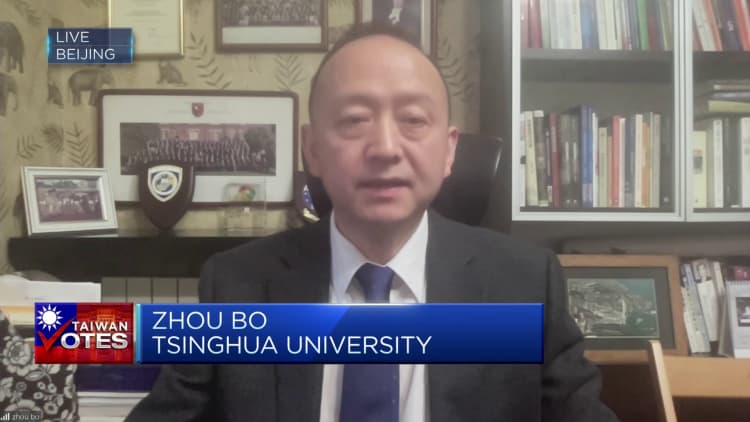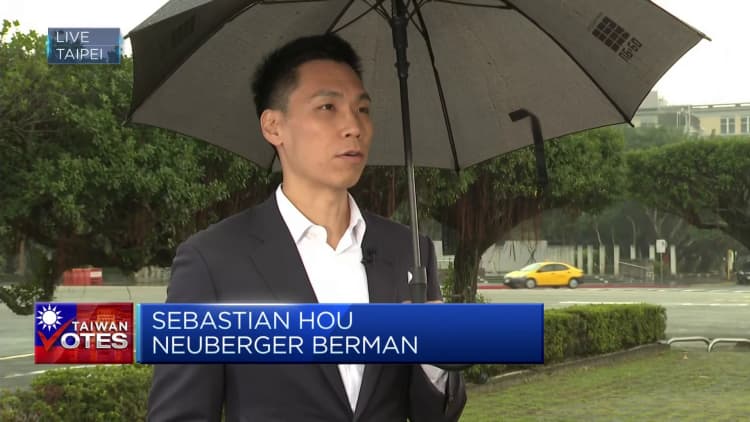Taiwan’s President Tsai Ing-wen speaks as Lai Ching-te, Taiwan’s vice president and the ruling Democratic Progressive Party’s (DPP) presidential candidate looks on during a campaign rally ahead of the elections in Taipei, Taiwan, January 11, 2024.
Carlos Garcia Rawlins | Reuters
Taiwan’s election results place the island on a “collision course with China” and the market reaction has been too sanguine, according to veteran investor David Roche.
Beijing has already dismissed the outcome of Saturday’s elections, which saw the ruling Democratic Progressive Party’s Lai Ching-te elected president alongside a split parliamentary vote.
China sees the DPP as a threat to its ultimate aim of “reunification” with the self-governing island of 23 million people, and claimed on Saturday that the outcome of the presidential election was not representative of popular opinion. The DPP rejects the so-called “One China principle” and advocates a separate and distinct Taiwanese national identity.
“If you look at what this election does, it tells you quite clearly there is absolutely no support in Taiwan for reunification with China, and that will not be possible,” Roche, president and global strategist at Independent Strategy, told CNBC’s “Squawk Box Europe” on Monday.
“What this election tells you in all of its ramifications, including the split of the vote in the Legislative Yuan, is that Taiwan is now a mature, sovereign, democratic state, and that is not something that China will accept. For China, that is separate to them, so that’s why you’re running towards a bigger crisis,” he said.
China over the weekend insisted that Taiwan is “China’s Taiwan” and lashed out at world leaders who congratulated Lai, accusing them of meddling in China’s internal affairs.
The market reaction was muted across Asian stocks on Monday, however. The Taiwan Weighted index rose 0.19% while mainland China’s CSI 300 index closed 0.1% lower.
The reason markets have responded in this muted manner, Roche contended, is because they are governed by the belief that “money buys everything,” and that the sheer scale and global significance of Taiwanese corporate giants like TSMC and Foxconn means Beijing will be reluctant to cause too great a disturbance.
“That is just simply a wrong view — [Chinese President Xi Jinping] puts politics way ahead of economics, always has, always has said so, and has always done so,” said Roche, who correctly predicted the development of the Asian crisis in 1997 and the 2008 global financial crisis.
Xi has repeatedly stated that Taiwan will be reunified with China, and has not ruled out using military force to achieve his goals. Many analysts believe a military incursion could occur if diplomacy is unsuccessful.
Roche argued that Xi will always prioritize the interests of the Chinese Communist Party over economics, a tendency he believes the market is overlooking as the outcome will “not be in any way calm” and places Taiwan “on a collision course with China.”


Status quo
Analysts at Citi struck a more optimistic tone on the election result, however, suggesting in a research note Sunday that Lai will likely “seek to maintain status quo in cross-strait relations.”
“The DPP lost its legislative majority, with the opposition KMT to occupy the most seats in the legislature though also short of a majority, with the TPP and independent legislators holding the swing votes; this is likely offer checks and balances to the ruling administration, but is unlikely to impede normal policy implementation,” the bank’s Taiwan Macro Strategy team said.
Citi believes Taiwan’s economic momentum will become increasingly visible going into the second half of the year ad the Taiwanese dollar is likely to outperform after “some initial turbulence with the election settling down.”


“The market is likely to shift focus back to fundamental factors of a better semiconductor industry outlook and lower global yields, which is more likely to increase foreign flows and be supportive for TWD, in our view,” the strategists added.
Yet Roche said Saturday’s voting patterns indicate that swathes of voters are disillusioned with Taiwan’s traditional major parties, and that to deliver on his promises of independence and sovereignty, Lai will need to reduce the dependence of the Taiwanese economy on China.
Lai won 40% of the popular vote, but his party lost 10 seats in Taiwan’s Parliament and fell below the threshold for a majority. The main opposition Kuomintang party won 52 seats, one more than the DPP, and the smaller Taiwan People’s Party’s eight seats makes it a potential kingmaker in the 113-seat Legislative Yuan.
TPP candidate Ko Wen-je garnered over 26% of the presidential vote, while the percentage of non-voters increased to 29%. Roche said this suggests a “certain fatigue with the classic politics of confrontation and compromise with China,” and pointed to a shift in younger voters’ priorities toward creating a more dynamic economy and affordable housing.
“Before he actually runs straight into any further confrontation with China, he has a big challenge about his domestic economy in getting back all of those disenchanted voters,” Roche added.
This story originally appeared on CNBC

